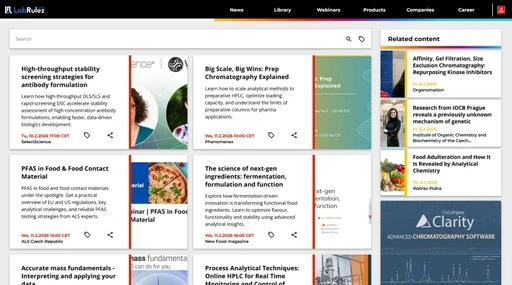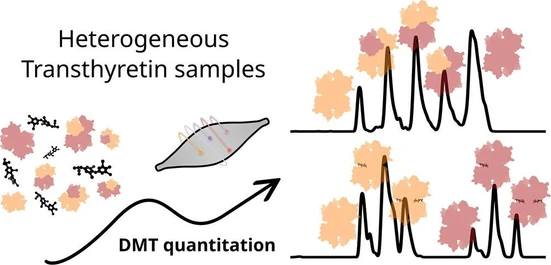News from LabRulezLCMS Library - Week 27, 2025

LabRulez: News from LabRulezLCMS Library - Week 27, 2025
Our Library never stops expanding. What are the most recent contributions to LabRulezLCMS Library in the week of 30th June 2025? Check out new documents from the field of liquid phase, especially HPLC and LC/MS techniques!
👉 SEARCH THE LARGEST REPOSITORY OF DOCUMENTS ABOUT LCMS AND RELATED TECHNIQUES
👉 Need info about different analytical techniques? Peek into LabRulezGCMS or LabRulezICPMS libraries.
This week we bring you other document by Agilent Technologies and posters by Shimadzu / ASMS, Thermo Fisher Scientific / ASMS and Waters Corporation / ASMS!
1. Agilent Technologies: Agilent InfinityLab Assist Hub: Representing Advancements in Cybersecurity
- Other document (white paper)
- Full PDF for download
The laboratory as an operational technology (OT) environment: bridging the gap between OT and IT
Compared to connected industrial production environments, the connected laboratory environment closely aligns with an operational technology (OT) environment. OT is defined as "the practice of using hardware and software to control industrial equipment, and it primarily interacts with the physical world" (RedHAT, 2024).
In the classical Purdue reference model, established in the early 1990s to protect identities, information, and assets, the OT environment is clearly separated and secured from the information technology (IT)/enterprise environment.
The model only allows direct communication between adjacent levels. OT environments (lab environments) are necessary due to the long life cycles of the systems typically exposed to cybersecurity threats, with the mitigations listed in Table 1.
Addressing cybersecurity challenges in OT environments requires customized security strategies that incorporate both traditional IT security principles and specific measures for the physical operations they control.
Unlike some IT system components and devices where complete infrastructure replacement is common, lab devices are typically replaced gradually over years, sometimes even over decades.
The clear separation between OT and IT is becoming increasingly blurred due to new connectivity requirements, cloud functionality, and Industrial Internet of Things integration. This process, known as IT/OT convergence, is essential for achieving the next level of automation, such as Industry 4.0/5.0 or its counterparts, such as Pharma 4.0. The effectiveness of any new development will be evaluated based on how well it addresses cybersecurity within a converging IT/OT environment.
Standards and organizations
The diverse standards and organizations can be exemplified by the approaches taken in the U.S., Europe, and China. This summary aims to showcase the complexity of regulatory environments, and is not comprehensive. For specific situations, consulting with dedicated field experts is crucial.
Europe
European cybersecurity regulations prioritize privacy and data protection, with an emphasis on harmonizing standards across member states.
- General Data Protection Regulation (GDPR): GDPR is the cornerstone of data protection in the European Union (EU). It sets strict rules on handling personal data, including requirements for data breach notifications, data minimization, and individual rights over personal data. Noncompliance can result in severe fines.
- Network and Information Security Directive (NIS Directive): Adopted in 2016, the NIS Directive focuses on the cybersecurity of essential services (such as energy, transportation, and finance) and digital service providers. It requires member states to strengthen their national cybersecurity capabilities and cooperation.
- European Union Agency for Cybersecurity (ENISA): ENISA is the EU's dedicated cybersecurity agency, helping to develop and promote cybersecurity standards across Europe, including guidelines for incident reporting and cybersecurity certifications.
- ISO/IEC 27001: While ISO/IEC 27001 is a global standard for information security management systems, it is heavily adopted in Europe. This standard outlines processes for systematically managing sensitive company information, ensuring its security.
- Cybersecurity Act (EU): The Cybersecurity Act establishes a framework for cybersecurity certification for products, services, and processes, ensuring they meet recognized EU-wide standards.
Conclusion
With the initial release of the InfinityLab Assist Control Software, the InfinityLab Assist Hub offers plenty of cybersecurity features that can be leveraged for a secure lab network environment founded on a customer-specific OT/IT security strategy.
2. Shimadzu / ASMS: Single Quadrupole Mass Spectrometry Quick Workflows Specified to Oligonucleotides Screening
- Poster
- Full PDF for download
A workflow has been developed to deliver molecular mass information on the full-length product and related impurities for chemically synthesized oligonucleotides by applying a deconvolution algorithm to all detected components within a targeted data stream (UV/PDA, TIC or BPC). It has been designed to simplify the data processing experience without the need for a sequence input delivering results quickly by automating mass assignment of all detected components in a data stream.
2. Materials and Methods
2.1 LC-MS/MS method
20-mer sample. A phosphorothioate-modified oligonucleotide purified was used as a model sample (20-mer anti-sense oligo; C229 H316 N69 O121 P19 S19; average mass 7168.05, Te-smCe-sTe-sTe-sGe-sGd-sTd-sTd-sAd-sCd-sAd-sTd-sGd-sAd-sAd-sAe-sTe-smCe-smCesmCe) spiked with 10% impurities (N-1(5’) and N-3(5’) shortmers) to the full-length product.
80-mer antisense DNA sample. 80-mer PolyT oligonucleotide sample (C800 H1041 N160 O558 P79; average mass 24273.62) was also analyzed was analyzed by ion-pair reversedphase chromatography mode using HFIP (hexafluoroisopropanol) and 10 mM TEA (triethylamine).
LC Separation. Components were separated using the Shimadzu Nexera XS inert LC and Shim-pack Scepter Claris column using HFIP (hexafluoroisopropanol) and 10 mM TEA (triethylamine) as ion pair additives.
Mass Spectrometry Detection. Shimadzu Single Quadrupole LCMS-2050. Data acquired in profile mode. MS mass scan m/z 600-2000; 1 secs; negative ion mode.
3.Results
3.1 Workflows and Methods
Insight Biologics software application supports two workflows to help accelerate oligonucleotide characterization. The default data processing behavior was driven by a defined FLP sequence to confirm sequence composition, identify product related impurities and assess impurity profiles. Data processing has been further augmented by enabling automated deconvolution routines to be applied without a defined FLP sequence input to help workflows that need to quickly check on molecular mass information in a synthesis (Figure 2).
4. Conclusions
- LabSolutions Insight Biologics offers flexibility by supporting both user-defined and automated deconvolution workflows for comprehensive oligonucleotide analysis.
- A Quick Picking algorithm has been developed and applied to the analysis of 20-mer and 80-mer antisense DNA. In the case of a 20-mer sample, the FLP and associated impurities were also automatically detected and molecular weight information reported. The analysis showed high correspondence with data processing results using a defined FLP sequence input.
- The Quick Picking algorithm enables a molecular weight confirmation of any detected peak and can be a powerful tool for synthesis confirmation in cases where the product is not as intended.
- This LC-MS analysis platform provides a rapid and cost-effective solution for purity analysis and molecular weight confirmation, making it ideal for quality control environments.
3. Thermo Fisher Scientific / ASMS: Comprehensive data acquisition workflow on a modified Orbitrap Astral MS to achieve deep lipidome coverage with high confidence annotations
- Poster
- Full PDF for download
Lipid identification is often considered the most challenging and bottleneck of the lipidomics workflow. This is due to the vast diversity of lipid structures, isomers and varying concentrations. Fragmentation of lipids generate characteristic fragments that help in lipid annotation, structural elucidation, isomer differentiation, and improved confidence in lipid identification. Having fragmentation for most of the lipids detected in a sample hence is highly desirable. This requires fast and sensitive instrumentation. Here we evaluated the new Orbitrap Astral Zoom mass spectrometer (Figure 1) for deeper lipidome coverage and confident lipid identification from 73 mice plasma extracts.
Materials and methods
Sample Preparation
Lipids were extracted from plasma samples obtained from 73 mice fed with a high fat diet and a normal diet. Lipid standards and bovine liver lipid extracts were purchased from Avanti Polar Lipids.
LCMS Method
Plasma lipid extract was separated using Thermo Scientific nanoLC PepMap (C18, 75µmx150mm, 2µm) column connected to a Vanquish Neo UHPLC system. Data acquisition was carried out on the Orbitrap Astral Zoom mass spectrometer using full-scan Orbitrap MS1 in parallel with data-dependent Astral MS2.
Data Analysis
Data processing was performed using Thermo Scientific Compound Discoverer 3.4 software. Compound Discoverer 3.4 software includes new features such as Thermo Scientific LipidSearch software node for simplified lipid identification, QC for small molecule experiments using internal standards, automatically detects and groups MS1 fragments and other performance improvements.
Results
Orbitrap Astral Zoom mass spectrometer DDA MS2 scan rate
The Orbitrap Astral Zoom mass spectrometer offers an enhanced MS2 scan rate compared to the already high-speed Orbitrap Astral MS system, enabling DDA with Top 30, Top 40, or even Top 50 MS2 scans (Figure 2) without compromising data quality. This advancement delivers unprecedented speed, achieving faster DDA MS2 scan rates than ever before.
Unprecedented speed and depth: dual analyzer power of Orbitrap Astral Zoom MS
The parallel data acquisition on Orbitrap Astral Zoom MS using both the Thermo Scientific Orbitrap analyzer and Thermo Scientific Astral analyzer, enables a higher number of Orbitrap HRAM MS1 full scans with sub-ppm mass accuracy. Simultaneously, the fast Astral analyzer delivers a significantly greater number of highquality MS2 scans at 80k resolution (77% more) compared to Orbitrap-Orbitrap configurations, which is essential for deep coverage and confident lipid identification (Figure 3).
Conclusions
- The novel Orbitrap Astral Zoom mass spectrometer provides deeper lipidome coverage and confident identification, utilizing the parallel operation of Orbitrap and Astral analyzers.
- The enhanced MS2 speed in Orbitrap Astral Zoom mode, coupled with Stepped NCE, enables efficient data acquisition and comprehensive lipidome coverage with a 15% increase with grade A and B lipid annotation.
- The use of nano-flow increased the sensitivity and the number of detected lipids while achieving a significant reduction in the use of sample and solvent.
- A significant difference was observed between control and high fat diet mice samples with potential biomarker upregulated neutral lipids (triglycerides and cholesterol esters) in the high fat diet.
4. Waters Corporation / ASMS: Routine EPA 1633 PFAS Analysis with a Novel Slotted Bandpass Ion Guide to Improve Signal Response Robustness
- Poster
- Full PDF for download
With increasing regulatory pressure around PFAS monitoring, this study evaluates a robust and long-term solution for EPA 1633A-compliant PFAS analysis. It focuses on how the StepWave XR ion guide, integrated into the Waters Xevo TQ Absolute XR tandem quadrupole mass spectrometer, improves signal robustness and method stability across demanding environmental matrices such as river water, biosolids, and landfill leachate.
Materials and Methods
Samples included NIST-certified biosolids, landfill leachate, and spiked river water. Solid-phase extraction (SPE) was followed by LC-MS/MS analysis on an ACQUITY Premier System with BEH C18 columns and detection via the Xevo TQ Absolute XR using negative electrospray ionization and MRM. The robustness of the method was assessed over 12 weeks with over 9,000 injections and weekly calibrations, using waters_connect for Quantitation Software for data processing and review.
Results
Throughout the 12-week study, all sample types showed high consistency and low variability. For example, L-PFHxS in biosolids averaged 8.78 µg/kg (%RSD 7.2%) compared to the certified 9.39 µg/kg, while PFOA in landfill leachate showed a mean of 2.52 ng/mL (%RSD 2.7%). QC plots confirmed that all monitored PFAS met trueness and ion ratio targets across thousands of injections with no unscheduled downtime, highlighting the system’s long-term reliability.
Conclusion
The StepWave XR ion guide enabled reliable, high-throughput PFAS analysis with minimal maintenance and excellent reproducibility. The Xevo TQ Absolute XR maintained calibration stability, accurate quantitation, and strong matrix resilience across diverse sample types. Combined with streamlined software workflows, this setup is well-suited for routine EPA 1633A PFAS analysis in environmental labs.




